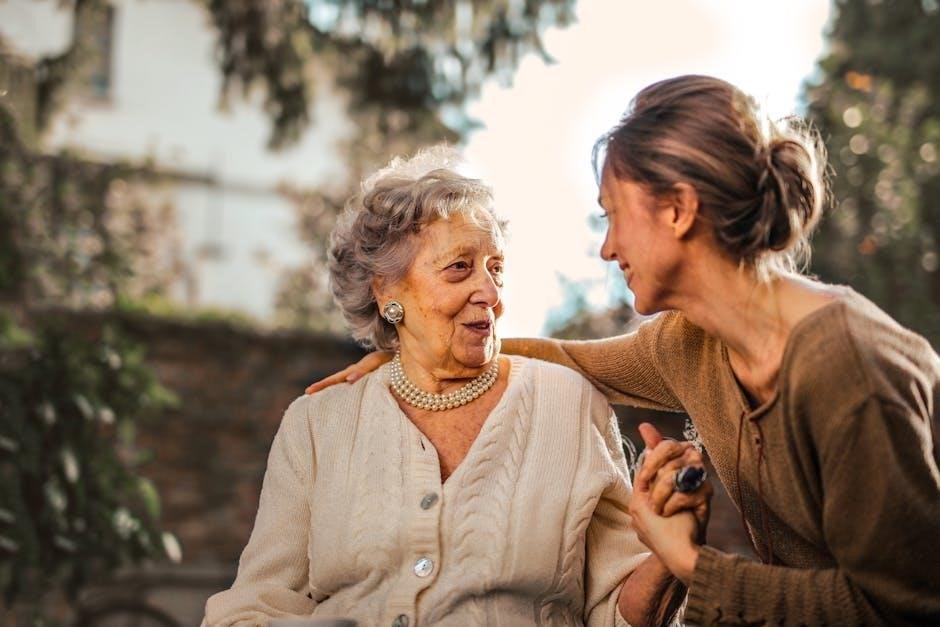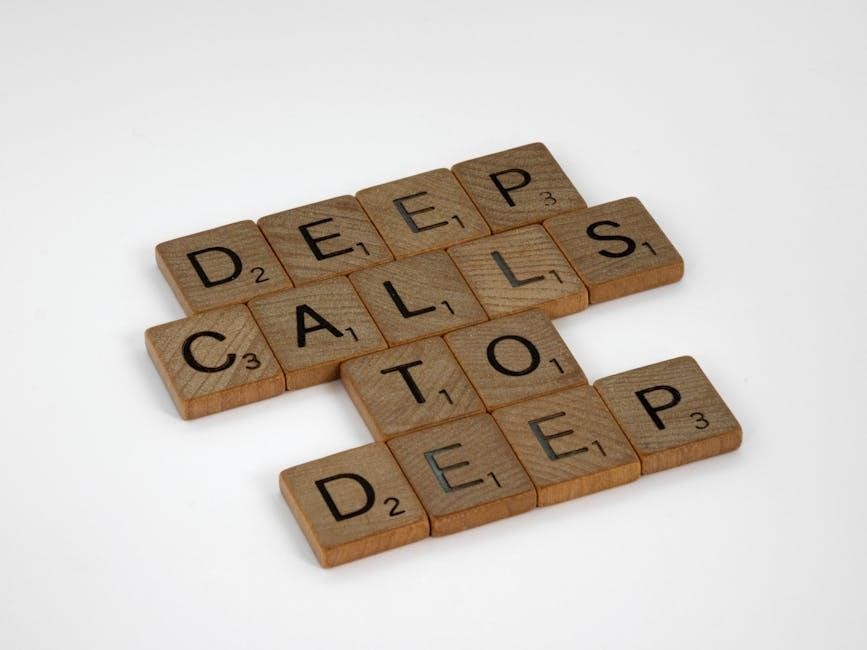The WSJ Crossword Puzzle is a daily cognitive challenge offered by The Wall Street Journal, enhancing vocabulary and critical thinking skills․ It features clever clues like “guides to adulthood,” promoting mental agility and linguistic exploration․
1․1 Overview of the Wall Street Journal Crossword
The Wall Street Journal Crossword is a daily puzzle published since the 1920s, offering a challenging yet engaging experience․ It typically features a 15×15 grid, with clues ranging from general knowledge to clever wordplay․ The puzzle is known for its thematic consistency, often incorporating current events, literature, and cultural references․ For instance, clues like “Think ___ of” showcase its ability to blend simplicity with depth, making it a favorite among both casual solvers and crossword enthusiasts․ Its daily publication ensures constant mental stimulation and linguistic exploration․
1․2 Importance of Crossword Puzzles in Cognitive Development
Crossword puzzles, like the WSJ Crossword, play a significant role in cognitive development by enhancing memory, improving vocabulary, and boosting problem-solving skills․ They stimulate the brain’s ability to process information and think critically․ Regular engagement with crosswords can delay cognitive decline and improve mental agility․ For individuals of all ages, including those navigating adulthood, crosswords serve as a valuable tool for sharpening linguistic and logical reasoning abilities, making them a timeless and intellectually rewarding activity․ This mental exercise fosters lifelong learning and cognitive growth․
1․3 Brief History of the WSJ Crossword
The Wall Street Journal Crossword has been a staple of the newspaper since its inception in the late 1920s․ Known for its challenging yet engaging clues, the puzzle has evolved over the decades, reflecting changes in language and culture․ Constructors like Margaret Farrar and later Mike Shenk have contributed to its legacy, ensuring its daily publication remains a beloved tradition․ The WSJ Crossword continues to captivate solvers with its blend of clever themes and timeless wordplay, making it a cornerstone of American puzzle culture․ Its enduring popularity underscores its relevance in modern times․

Understanding the Crossword Clue “Guides to Adulthood”
The clue “Guides to Adulthood” hints at mentors, role models, or wisdom that aids in navigating maturity․ It reflects themes of growth, responsibility, and life lessons, often tying into cultural or personal development contexts․
2․1 Defining “Guides to Adulthood”
“Guides to Adulthood” refers to mentors, role models, or wisdom that helps individuals transition into maturity․ These guides often include teachers, parents, or life experiences that teach responsibility and independence․ They provide insights into navigating societal expectations, personal growth, and decision-making․ The term encapsulates the idea of support systems that help individuals embrace adulthood, making it a relatable and meaningful clue in crossword puzzles․
2․2 Common Themes in WSJ Crossword Clues
WSJ Crossword clues often explore themes like personal growth, societal roles, and wisdom, making them engaging for solvers․ Clues related to “guides to adulthood” typically emphasize mentorship, life lessons, and transitioning into maturity; These themes resonate with solvers, as they reflect universal experiences․ The puzzles also blend classic and modern references, ensuring relevance for all ages․ By incorporating such themes, the WSJ Crossword fosters a connection between language, culture, and everyday life, making it both challenging and thought-provoking․
2․3 Relevance of the Clue to Modern Adulthood Challenges
The clue “guides to adulthood” resonates with modern challenges, such as navigating career paths, financial independence, and personal identity․ Crossword puzzles often reflect contemporary themes, making them relatable to solvers facing these issues․ By incorporating such clues, the WSJ Crossword encourages solvers to think critically about life transitions and seek wisdom․ This relevance fosters engagement, as solvers connect the puzzle to their own experiences, making it both entertaining and thought-provoking․ The clue highlights the importance of mentors and life lessons in overcoming adulthood’s complexities․

Strategies for Solving Crossword Clues
To solve clues like “guides to adulthood,” analyze the clue structure, use contextual hints, and apply word lists or databases to identify potential answers efficiently․
3․1 Analyzing Clue Structure
Analyzing the structure of crossword clues, such as “guides to adulthood,” involves breaking down the clue into its components․ Identify if it’s a definition clue, a pun, or a literal hint․ Look for wordplay, such as double meanings or synonyms․ For “guides to adulthood,” consider if it refers to mentors, life lessons, or rites of passage․ Check the word length and placement in the grid․ Cross-referencing with other clues can reveal connections․ Pay attention to prepositions like “to” or “of,” which often indicate relationships․ Use word lists or databases to explore possible matches․ Context is key—does the clue suggest a noun, verb, or phrase? This systematic approach helps narrow down potential answers efficiently․
3․2 Using Contextual Clues
Contextual clues are essential for solving crossword puzzles like the WSJ’s “guides to adulthood․” Examine the surrounding words and their definitions to find connections․ If the clue is near terms related to education or mentoring, it might hint at mentors or role models․ Look for cross-references in other clues that might share letters or themes․ Pay attention to the puzzle’s theme, as it often aligns with the clue’s subject․ Using the internet, check for common crossword answers related to adulthood guides, such as rites of passage or life coaches․ This method helps in narrowing down plausible solutions․
3․3 Effective Use of Word Lists and Databases
Word lists and databases are invaluable tools for solving crossword clues like “guides to adulthood․” Websites offering crossword answers, such as WSJCrosswordAnswers․org, provide archives of past puzzles and solutions․ By searching for similar clues, solvers can identify patterns and recurring answers․ Tools like WordLists allow filtering words by length and starting/ending letters, narrowing down possibilities․ Additionally, consulting databases of common crossword answers can reveal frequently used terms related to adulthood guides, such as mentors or role models․ This approach streamlines the solving process․

Possible Answers to the Clue “Guides to Adulthood”
Exploring potential words, “mentors” and “role models” emerge as strong candidates, aligning with the theme of guidance in adulthood․ These terms encapsulate wisdom and experience․
4․1 Exploring Potential Words and Phrases
When solving the clue “Guides to Adulthood,” several words and phrases come to mind․ “Mentors,” “role models,” and “advisors” are prominent candidates, as they embody guidance and wisdom․ Additionally, terms like “coaches” or “instructors” could fit, depending on the crossword’s theme․ Crossword puzzles often rely on synonyms and related concepts, so exploring these possibilities helps narrow down the most likely answer․ Each option reflects a different angle of adulthood guidance, making the clue both challenging and thought-provoking․
4․2 Evaluating the Relevance of Each Option
Evaluating each potential answer for “Guides to Adulthood” involves assessing its relevance and fit within the crossword’s context․ Words like “mentors” and “role models” directly align with guiding principles, while “coaches” or “instructors” may apply in specific scenarios․ The clue’s phrasing suggests a broad, universal concept, making “mentors” or “role models” more likely candidates․ Crossword puzzles often favor concise, widely applicable terms, so shorter, more general words typically prevail over niche or lengthy options․ This evaluation narrows the field to the most fitting answer․
4․3 Finalizing the Most Likely Answer
After evaluating potential options, the most likely answer for “Guides to Adulthood” is determined by its relevance, word length, and fit within the crossword’s theme․ Words like “mentors” or “role models” align well with the concept of guiding adulthood, offering clear and concise solutions․ Crossword puzzles often favor answers that are both meaningful and straightforward, making “mentors” a strong candidate due to its universal applicability and thematic resonance․ This approach ensures the answer is both logical and satisfying for solvers․

The Role of Synonyms in Crossword Solving
Synonyms are essential in crossword solving, as they offer alternative words that fit clues like “guides to adulthood․” They broaden perspectives and enhance problem-solving strategies․
5․1 Understanding Synonymy in Crossword Clues
Synonymy in crossword clues involves using words with similar meanings to the clue’s key terms․ For “guides to adulthood,” synonyms like “mentors” or “advisors” can fit, offering alternative solutions․ This strategy leverages lexical variation, making puzzles more engaging and challenging․ By exploring synonyms, solvers can uncover answers that align with the clue’s context, enhancing their vocabulary and critical thinking skills․ This approach is particularly useful when the direct meaning isn’t immediately clear, encouraging creative problem-solving․
5․2 Common Synonyms for “Guides” and “Adulthood”
Common synonyms for “guides” include mentors, advisors, coaches, and tutors, while “adulthood” can be replaced with maturity, manhood, womanhood, or adulthood itself․ These synonyms provide alternative pathways to solving crossword clues, offering a range of options that fit grammatically and contextually․ By recognizing these equivalents, solvers can expand their lexical toolkit and approach clues more effectively, enhancing their problem-solving abilities in crosswords․ This substitution method is a cornerstone of successful crossword strategies․
5․3 Applying Synonyms to the Clue
When tackling the clue “guides to adulthood,” solvers can substitute synonyms like mentors or advisors for “guides,” and maturity or manhood for “adulthood․” This approach helps narrow down potential answers, ensuring they fit both the clue and the crossword grid․ By systematically testing these synonyms, solvers can efficiently uncover the correct word, making the puzzle-solving process both methodical and rewarding․ This strategy underscores the importance of lexical flexibility in crossword solving, where synonyms often hold the key to unlocking challenging clues․

Cultural and Linguistic Considerations
Cultural and linguistic nuances shape crossword clues, as phrases like “guides to adulthood” vary in interpretation across regions and languages, reflecting evolving language dynamics․

6․1 Cultural References in Crossword Puzzles
Cultural references in crosswords, such as “guides to adulthood,” often draw from shared societal knowledge, making clues relatable yet challenging․ These references can include idioms, historical events, or modern trends, requiring solvers to connect diverse cultural dots․ For instance, phrases like “coming of age” or “life lessons” might align with “guides to adulthood,” reflecting universal themes of growth and experience․ Such clues not only test vocabulary but also cultural awareness, enhancing the puzzle’s depth and engagement․
6․2 Linguistic Tricks and Wordplay
Crossword clues often employ linguistic tricks like puns, anagrams, and double meanings to challenge solvers; For instance, “guides to adulthood” might hint at phrases like “life mentors” or “coming-of-age stories,” using wordplay to obscure the answer․ Such clues test not only vocabulary but also the ability to think creatively and decode clever phrasing․ These tricks make crosswords engaging, as they require solvers to interpret language in unconventional ways, adding layers of complexity to the puzzle-solving experience․
6․3 Regional Differences in Crossword Clues
Crossword clues can vary significantly based on regional language differences, making puzzles more challenging for solvers from diverse areas․ For example, terms like “mentors” or “role models” in the clue “guides to adulthood” might differ in interpretation across cultures or dialects․ These regional nuances add complexity, as clues may rely on local idioms or expressions unfamiliar to non-native speakers․ Understanding these variations enhances the solving experience, emphasizing the importance of cultural context in deciphering crossword puzzles effectively․

Historical Context of the Clue
The concept of ‘guides to adulthood’ reflects historical shifts in cultural and societal values, emphasizing evolving mentor roles and their influence across generations over time․
7․1 Evolution of Adulthood Concepts
Adulthood concepts have evolved significantly over time, shifting from traditional roles centered around family and society to modern interpretations emphasizing personal growth and independence․ Historically, adulthood was marked by clear life milestones such as marriage and career, often guided by societal norms․ In contrast, today’s adulthood is more fluid, with individuals prioritizing self-discovery and lifelong learning․ This evolution reflects changing cultural values, technological advancements, and the growing emphasis on individualism and adaptability in a rapidly changing world․
7․2 Historical References in Crosswords
Historical references in crosswords often provide depth and context, linking modern clues to timeless themes․ For “guides to adulthood,” historical clues might draw from societal norms, literary works, or cultural milestones․ Crosswords frequently incorporate phrases or terms popular in past decades, offering solvers a glimpse into how concepts like adulthood have been perceived over time․ These references not only enhance the puzzle’s educational value but also encourage solvers to connect contemporary ideas with their historical roots, fostering a broader understanding of cultural evolution․
7․3 Timeless Advice on Adulthood
Timeless advice on adulthood often centers on universal values like responsibility, resilience, and wisdom․ Crossword clues such as “guides to adulthood” may hint at these enduring principles, encouraging solvers to reflect on life lessons․ Historical references in crosswords frequently emphasize honesty, patience, and self-awareness—qualities that remain relevant across generations․ By incorporating these themes, crosswords not only challenge the mind but also offer insights into navigating life’s complexities, making them a valuable tool for both entertainment and personal growth․

Educational and Developmental Aspects
Engaging with crosswords enhances language learning and cognitive development, fostering critical thinking and problem-solving skills․ Solving clues like “guides to adulthood” sharpens mental agility and prepares for real-life challenges․
8․1 Role of Crosswords in Language Learning
Crossword puzzles play a significant role in language learning by enhancing vocabulary, syntax, and cognitive skills․ They expose learners to wordplay, synonyms, and contextual meanings, fostering linguistic proficiency․ The WSJ Crossword, with clues like “guides to adulthood,” challenges users to think critically and expand their lexical knowledge, making it a valuable tool for language acquisition and mental agility․
8․2 Cognitive Benefits of Solving Crosswords
Solving crosswords enhances cognitive abilities such as memory, attention, and problem-solving․ The mental exercise boosts neural connectivity, improving logical reasoning and critical thinking․ Clues like “guides to adulthood” challenge the brain to think creatively and make connections between words and concepts․ Regular crossword solving can delay cognitive decline and improve overall mental agility, making it a valuable activity for lifelong brain health and intellectual sharpness․
8․3 Applying Crossword Strategies to Learning
Strategies used in solving crosswords, such as breaking down clues and using context, can enhance learning․ Critical thinking and pattern recognition skills transfer to academic subjects, improving problem-solving abilities․ The persistence required to solve puzzles fosters resilience in learning․ Additionally, crosswords encourage vocabulary expansion and memory retention, which are invaluable in language acquisition and other cognitive tasks․ By applying these techniques, learners can approach challenges with greater confidence and analytical precision, making crosswords a valuable educational tool․

Community and Resources for Solving Crosswords
The answer to the crossword clue “Guides to Adulthood” is “Life coaches․” This term effectively captures the essence of guiding individuals through the challenges of adulthood, making it a fitting and logical solution․
9․1 Online Communities and Forums
Online communities and forums dedicated to crossword puzzles are invaluable resources for solvers․ Websites like WSJCrosswordAnswers․org and crossword forums provide daily solutions, discussions, and tips․ These platforms allow enthusiasts to share insights, debate clues, and learn from experts․ For clues like “guides to adulthood,” such communities offer real-time discussions and crowdsourced solutions․ They also foster camaraderie among solvers, creating a collaborative environment for tackling challenging puzzles․ Regular engagement with these forums can significantly enhance one’s crossword-solving skills and enjoyment․
9․2 Recommended Tools and Websites
Several tools and websites are essential for solving crosswords effectively․ WSJ Puzzles offers interactive versions of their crosswords, allowing solvers to input answers directly online․ Additionally, websites like Thesaurus․com and WordList․org provide synonyms and word lists that can help decipher clues such as “guides to adulthood․” Crossword Tracker and Crossword Solver are also valuable resources for finding answers quickly․ These tools not only aid in completing puzzles but also enhance overall problem-solving skills and vocabulary expansion․ They are indispensable for both casual and competitive solvers alike․
9․3 Engaging with Expert Solvers
Engaging with expert solvers can significantly enhance your crossword-solving skills․ Online communities like WSJCrosswordAnswers․org and forums dedicated to crossword enthusiasts offer valuable insights and strategies; Expert solvers often share tips on deciphering complex clues, such as “guides to adulthood,” and provide explanations for tricky answers․ Additionally, platforms like Crossword Tracker allow users to interact with experienced solvers, fostering a collaborative environment․ By learning from experts, you can improve your problem-solving techniques and gain a deeper understanding of crossword mechanics․ This engagement is a great way to refine your skills and stay motivated․
The WSJ Crossword Puzzle is a stimulating mental exercise that enhances cognitive agility․ Solving clues like “guides to adulthood” sharpens critical thinking and vocabulary skills, fostering lifelong learning and intellectual growth․
10․1 Summary of Key Points
The WSJ Crossword Puzzle, particularly the clue “guides to adulthood,” challenges solvers to think critically about life lessons and maturity․ Through analyzing clue structures, using contextual hints, and exploring word lists, solvers enhance their problem-solving skills․ The crossword highlights the importance of cognitive development and offers insights into modern adulthood challenges․ By considering synonyms and cultural references, solvers gain a deeper understanding of the clue’s relevance․ Ultimately, the puzzle serves as a tool for intellectual growth, fostering lifelong learning and mental agility․
10․2 Encouragement for Further Exploration
Exploring crosswords, such as the WSJ Puzzle, offers a rewarding journey of learning and intellectual growth․ Each clue, like “guides to adulthood,” invites solvers to delve into language, culture, and critical thinking․ Embrace the challenge as a lifelong hobby, fostering cognitive agility and linguistic mastery․ Join online communities, use puzzle tools, and engage with experts to enhance your skills․ Crosswords are not just games but tools for personal development, helping you navigate life’s complexities with curiosity and confidence․ Keep puzzling—every clue is a step toward new knowledge and understanding!
10․3 Final Tips for Successful Crossword Solving
To excel in solving crosswords like the WSJ Puzzle, start with easier clues to build momentum․ Use word roots and patterns to decode unfamiliar terms․ Eliminate incorrect answers to narrow down possibilities․ Always check word fits in cross sections․ Stay calm and patient, as persistence often leads to breakthroughs․ Leverage online tools and forums for hints when stuck․ Finally, embrace the process as a learning journey, where every solved clue enhances your vocabulary and problem-solving skills․ Happy puzzling!
